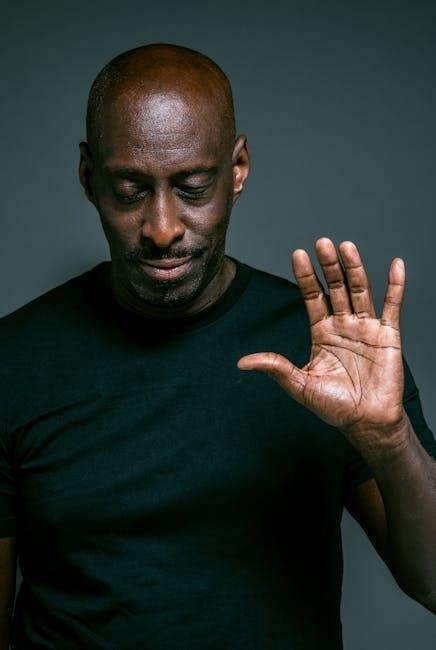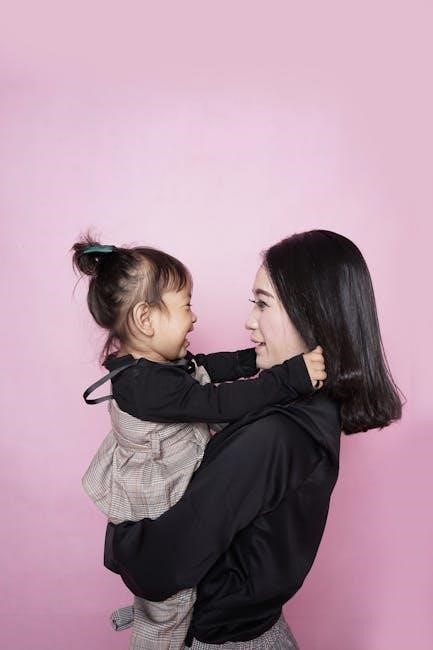stop caretaking the borderline or narcissist pdf

stop caretaking the borderline or narcissist pdf
Understanding the Concept of Caretaking in Relationships
Caretaking involves prioritizing others’ emotional needs over one’s own‚ often leading to loss of personal identity. It’s mistaken for love or support but fosters dependency and drains the caretaker emotionally‚ particularly in relationships with borderline or narcissistic individuals.
Defining Caretaking and Its Impact on Personal Identity
Caretaking is a pattern where one prioritizes others’ emotional needs over their own‚ often sacrificing personal identity. This role often stems from a deep-seated need to feel valued‚ but it leads to emotional depletion. In relationships with borderline or narcissistic individuals‚ caretakers may lose themselves entirely‚ fostering dependency and resentment. The caretaker’s sense of self becomes entangled with the other’s needs‚ making it difficult to distinguish personal desires and boundaries.
The Role of Caretakers in Borderline and Narcissistic Relationships
Caretakers in borderline or narcissistic relationships often take on the role of emotional fixers‚ trying to heal or stabilize their partner. They may enable dysfunctional behavior by consistently giving in‚ which perpetuates the cycle of dependency. This dynamic leads to an imbalance‚ as the caretaker sacrifices their own needs while the borderline or narcissist becomes increasingly reliant on their emotional support‚ fostering a lack of reciprocity and personal fulfillment for the caretaker.
Recognizing the Signs of Caretaking Behavior
Caretaking behavior often manifests as excessive emotional support‚ sacrificing personal needs‚ and enabling dysfunctional patterns. It’s driven by a deep-seated need for control or fear of abandonment.
Emotional Patterns and Sacrifices Made by Caretakers
Caretakers often exhibit patterns of constant vigilance‚ sacrificing their own needs to manage the emotions of borderline or narcissistic individuals. They may suppress their feelings to avoid conflict‚ leading to emotional exhaustion. Over time‚ this dynamic erodes their sense of self and autonomy‚ as they prioritize others’ stability over their own well-being‚ creating an unsustainable and draining relationship cycle.
The Difference Between Healthy Support and Unhealthy Caretaking
Healthy support involves mutual respect and balance‚ where both partners contribute emotionally. Unhealthy caretaking‚ however‚ is one-sided‚ with the caretaker sacrificing their own needs to stabilize the other person. This imbalance fosters dependency and resentment‚ unlike healthy support‚ which empowers and nurtures growth in both individuals‚ maintaining personal boundaries and emotional well-being for all involved in the relationship.

Why Caretaking Doesn’t Work with Borderlines or Narcissists
Caretaking often enables borderline or narcissistic behavior‚ creating an imbalance without fostering genuine change or reciprocity‚ leading to emotional exhaustion for the caretaker.
The Enablement of Dysfunctional Behavior
Caretaking often unintentionally enables dysfunctional behavior in borderlines or narcissists by consistently meeting their emotional demands. This creates a cycle where the caretaker’s efforts reinforce manipulative tactics‚ preventing authentic accountability. Over time‚ the borderline or narcissist learns to rely on the caretaker’s sacrifices‚ deepening dependency rather than encouraging personal growth or healthy communication patterns in the relationship.
The Lack of Reciprocity in the Relationship

In caretaking dynamics‚ relationships with borderlines or narcissists often lack true reciprocity. The caretaker invests emotional labor‚ seeking validation‚ while the other party remains focused on their needs. This imbalance creates resentment and exhausts the caretaker‚ as their efforts are rarely matched‚ leading to a one-sided connection that undermines mutual respect and genuine emotional exchange;
The Drama Triangle and Its Role in Caretaking
The Drama Triangle‚ consisting of Victim‚ Rescuer‚ and Persecutor roles‚ traps caretakers in cycles of blame and dependency‚ hindering healthy relationships and making it difficult to break free without self-awareness.
Understanding the Victim‚ Rescuer‚ and Persecutor Roles

In the Drama Triangle‚ the Victim seeks sympathy‚ the Rescuer tries to fix problems‚ and the Persecutor blames others. Caretakers often identify as Rescuers‚ sacrificing their needs to help others‚ while borderline or narcissistic individuals may oscillate between Victim and Persecutor roles. This dynamic perpetuates emotional dependency‚ distorts personal identity‚ and traps caretakers in cycles of blame and responsibility‚ making it difficult to break free without self-awareness.
How the Drama Triangle Perpetuates Unhealthy Dynamics
The Drama Triangle reinforces unhealthy patterns as caretakers enable borderline or narcissistic individuals by constantly “rescuing” them. This creates dependency‚ preventing true accountability and growth. The caretaker’s sacrifices fuel feelings of martyrdom‚ while the other person oscillates between victimhood and persecution‚ maintaining control. This cycle traps both parties‚ reinforcing emotional turmoil and making it difficult for the caretaker to break free without external support or self-awareness.

Setting Boundaries to Stop Caretaking
Setting boundaries protects emotional well-being and prevents enabling. It involves clearly defining limits‚ communicating them assertively‚ and maintaining consistency. Boundaries empower caretakers to step back‚ fostering mutual respect and breaking the cycle of unhealthy caretaking patterns in relationships with borderline or narcissistic individuals.
Strategies for Establishing and Maintaining Healthy Boundaries
Healthy boundaries require clear communication‚ consistency‚ and self-awareness. Start by identifying personal limits and expressing them assertively. Use “I” statements to avoid blame‚ and set consequences for violations. Regularly reinforce boundaries by staying committed‚ even when met with resistance. Prioritize self-care to maintain emotional resilience‚ ensuring boundaries are sustainable and respected in all relationships‚ especially with borderline or narcissistic individuals.
The Importance of Self-Care in Breaking the Caretaking Cycle
Self-care is essential for breaking the caretaking cycle‚ as it helps individuals reclaim their identity and emotional well-being. Prioritizing personal needs‚ engaging in activities that bring joy‚ and practicing mindfulness can foster resilience. By focusing on self-care‚ caretakers can detach from unhealthy patterns‚ regain emotional balance‚ and develop the strength to establish healthier boundaries‚ ultimately shifting focus from others’ needs to their own empowerment and well-being.

The Five As: A Guide to Healthy Relationships
The Five As—Attention‚ Affection‚ Appreciation‚ Acceptance‚ and Accountability—form the foundation of balanced relationships. They promote mutual respect and emotional fulfillment‚ fostering a healthy partnership.
Attention‚ Affection‚ Appreciation‚ Acceptance‚ and Accountability
These five principles create a framework for healthy relationships. Attention ensures active listening‚ Affection fosters emotional connection‚ Appreciation acknowledges efforts‚ Acceptance promotes understanding‚ and Accountability encourages responsibility. Together‚ they build trust and mutual respect‚ contrasting sharply with caretaking dynamics that often lack reciprocity and balance‚ as seen in relationships with borderline or narcissistic individuals.
Applying the Five As to Move Beyond Caretaking
The Five As—Attention‚ Affection‚ Appreciation‚ Acceptance‚ and Accountability—guide healthy relationships. By applying these principles‚ individuals can shift from caretaking to mutual respect. Attention and Affection foster connection‚ while Appreciation and Acceptance validate both partners. Accountability ensures responsibility‚ creating balance and reciprocity. This framework helps transition from one-sided dynamics‚ promoting emotional equality and personal well-being in relationships with borderline or narcissistic individuals.
When to Walk Away: Knowing When the Relationship Is Unsalvageable
Recognizing when caretaking efforts are futile and the relationship is toxic is crucial. Walking away becomes necessary to protect your well-being and break the cycle of dysfunction.
Recognizing When Caretaking Efforts Are Futile
Recognizing futility involves acknowledging that despite your efforts‚ the relationship remains unhealthy. The borderline or narcissist may resist change‚ continuing manipulative behaviors. Emotional exhaustion and lack of reciprocity signal that caretaking is ineffective. It’s essential to accept that you cannot fix others and that your well-being depends on ending the cycle of enabling and drama.
How to Let Go and Move On from Toxic Relationships
Letting go requires setting clear boundaries and prioritizing self-care. Recognize the futility of caretaking and accept that the relationship cannot be salvaged. Seeking support from therapy or groups helps rebuild identity and resilience. Focus on personal growth and healthy relationships‚ applying principles like the Five As to ensure mutual respect and reciprocity‚ enabling a path toward emotional healing and independence from toxic dynamics.

Healing and Recovery After Caretaking
Healing involves rebuilding self-identity and emotional resilience through self-care and therapy. Support groups and personal growth aid in overcoming caretaking cycles‚ fostering independence and well-being.
Rebuilding Self-Identity and Emotional Resilience
Rebuilding self-identity involves recognizing and reconnecting with your true self‚ separate from the caretaker role. Emotional resilience is restored by acknowledging past sacrifices‚ setting boundaries‚ and prioritizing personal needs. Therapy and support groups provide guidance and validation‚ helping individuals heal from the emotional toll of caretaking. This journey requires patience‚ self-compassion‚ and a commitment to reclaiming one’s independence and well-being.
The Role of Therapy and Support Groups in Recovery
Therapy and support groups play a vital role in recovery by providing a safe space to process emotions and gain insights. They help individuals break free from caretaking patterns‚ develop self-awareness‚ and rebuild their identity. Support groups offer validation and connection‚ while therapy provides personalized strategies for healing. Both modalities empower individuals to prioritize self-care‚ set boundaries‚ and develop healthier relationship dynamics‚ fostering long-term emotional resilience and well-being.

Preventing Future Caretaking Patterns
Preventing caretaking involves self-awareness‚ boundary-setting‚ and recognizing red flags in relationships. It requires prioritizing personal needs and avoiding emotional over-investment in others‚ fostering healthier dynamics.

Identifying Red Flags in Potential Relationships
Identifying red flags involves recognizing manipulative behaviors‚ emotional demands‚ and a lack of accountability. These signs often indicate a potential for unhealthy dynamics‚ where one partner may exploit the other’s caretaking tendencies. Being aware of these patterns early can prevent falling into toxic relationships and reduce the risk of emotional exhaustion. Recognizing these traits encourages healthier choices and fosters more balanced connections.
Developing Self-Awareness to Avoid Repeating Caretaking Behaviors
Self-awareness is key to breaking the caretaking cycle. Recognizing personal patterns‚ emotional triggers‚ and the tendency to prioritize others’ needs over your own helps identify unhealthy dynamics early. Understanding how past experiences shape caretaking behaviors empowers you to set boundaries and resist emotional manipulation. Therapy and self-reflection can deepen this awareness‚ fostering healthier relationships and preventing future emotional depletion. Self-awareness is the first step toward reclaiming your identity and well-being.
Empowerment begins with recognizing the cycle and choosing self-priority. Breaking free from caretaking fosters personal growth‚ healthy relationships‚ and a life focused on your well-being and happiness.
Key strategies include setting clear boundaries‚ embracing self-awareness‚ and prioritizing personal needs. Breaking the drama triangle‚ avoiding emotional over-involvement‚ and fostering reciprocal relationships are essential. Practicing self-care‚ applying the Five As‚ and seeking support from therapy or groups can empower individuals to end caretaking patterns and focus on their own well-being and growth.
Encouragement to Take Action and Prioritize Personal Well-Being
Empower yourself to break free from caretaking by setting boundaries and focusing on self-care. Recognize the Drama Triangle’s hold and shift toward reciprocal relationships using the Five As. Taking action to prioritize your well-being is not selfish—it’s essential. Seek support‚ embrace personal growth‚ and move beyond toxic dynamics to reclaim your identity and live a fulfilling life.